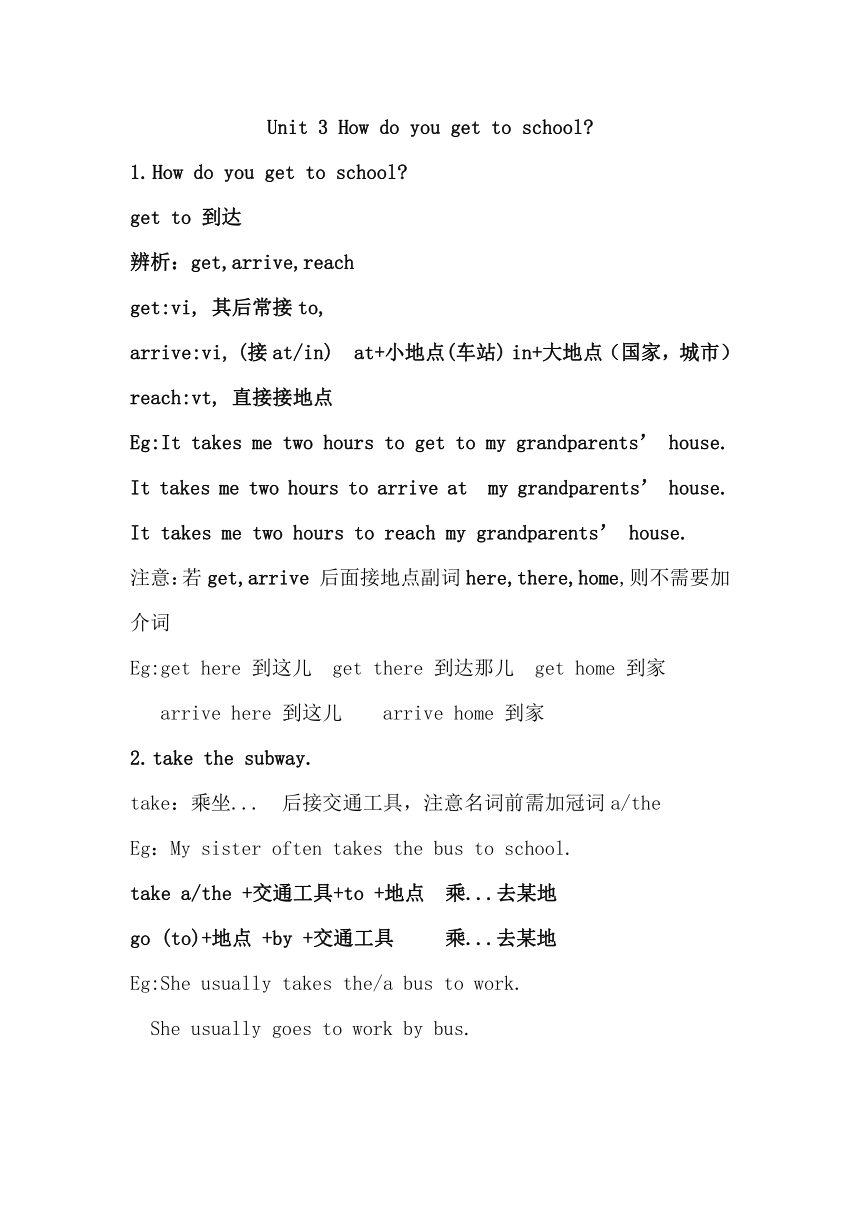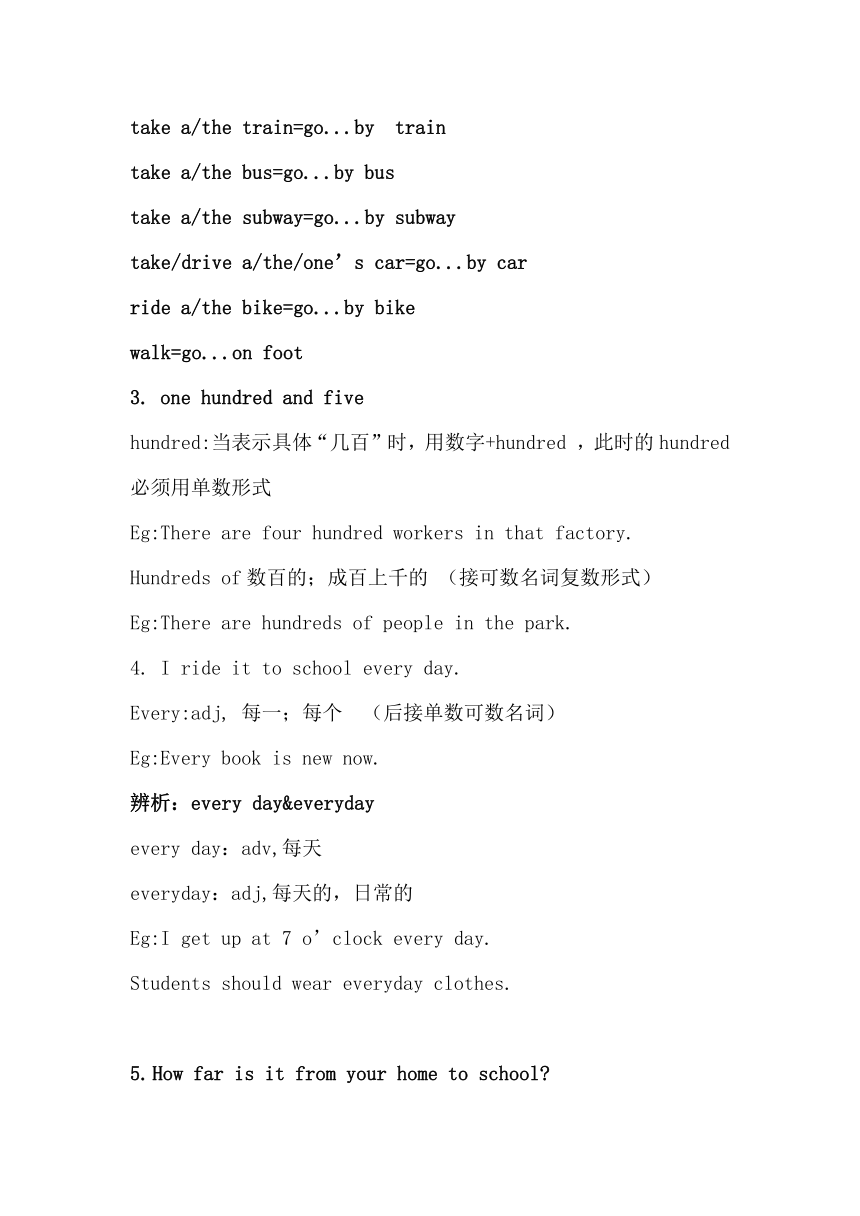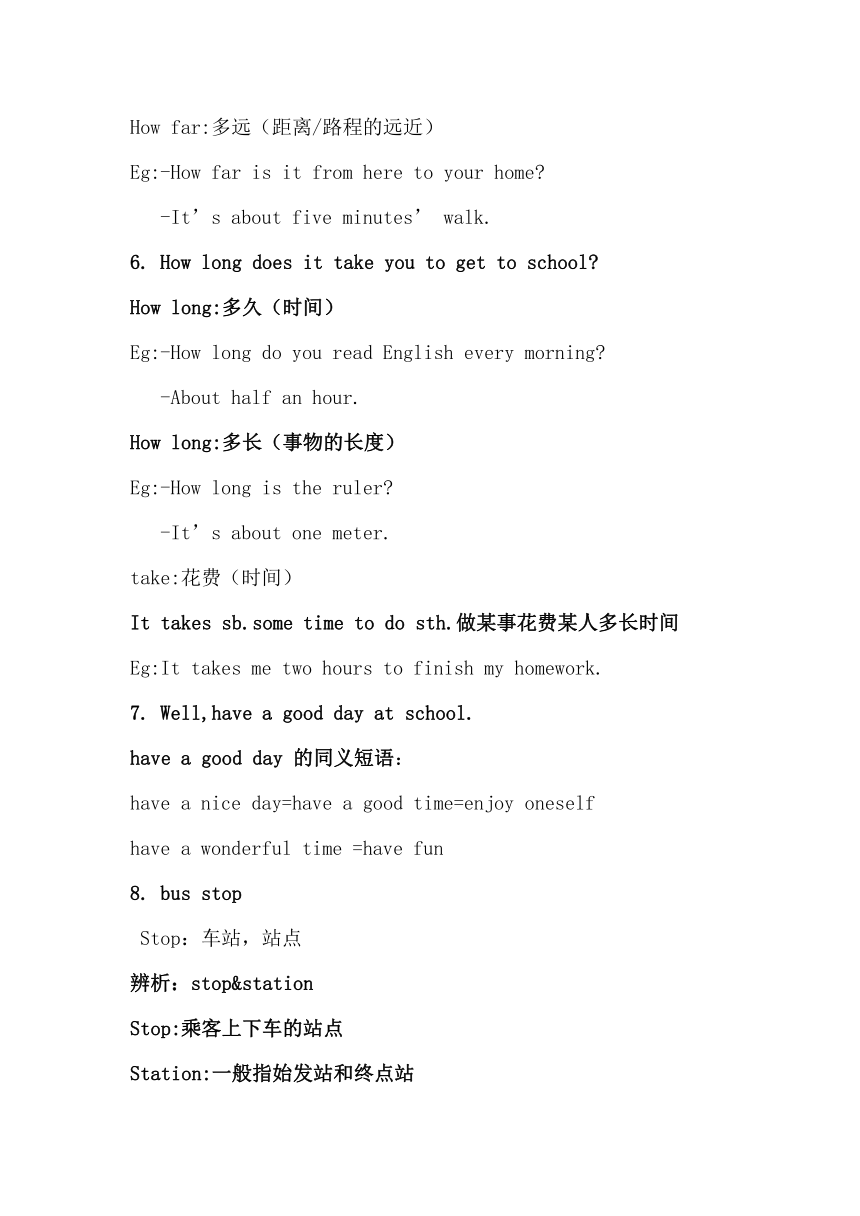人教版七年级下册Unit3How do you get to school?讲义
文档属性
| 名称 | 人教版七年级下册Unit3How do you get to school?讲义 |  | |
| 格式 | docx | ||
| 文件大小 | 21.0KB | ||
| 资源类型 | 教案 | ||
| 版本资源 | 人教新目标(Go for it)版 | ||
| 科目 | 英语 | ||
| 更新时间 | 2024-01-11 21:25:53 | ||
图片预览



文档简介
Unit 3 How do you get to school
How do you get to school
get to 到达
辨析:get,arrive,reach
get:vi, 其后常接to,
arrive:vi, (接at/in) at+小地点(车站) in+大地点(国家,城市)
reach:vt, 直接接地点
Eg:It takes me two hours to get to my grandparents’ house.
It takes me two hours to arrive at my grandparents’ house.
It takes me two hours to reach my grandparents’ house.
注意:若get,arrive 后面接地点副词here,there,home,则不需要加介词
Eg:get here 到这儿 get there 到达那儿 get home 到家
arrive here 到这儿 arrive home 到家
take the subway.
take:乘坐... 后接交通工具,注意名词前需加冠词a/the
Eg:My sister often takes the bus to school.
take a/the +交通工具+to +地点 乘...去某地
go (to)+地点 +by +交通工具 乘...去某地
Eg:She usually takes the/a bus to work.
She usually goes to work by bus.
take a/the train=go...by train
take a/the bus=go...by bus
take a/the subway=go...by subway
take/drive a/the/one’s car=go...by car
ride a/the bike=go...by bike
walk=go...on foot
one hundred and five
hundred:当表示具体“几百”时,用数字+hundred ,此时的hundred必须用单数形式
Eg:There are four hundred workers in that factory.
Hundreds of数百的;成百上千的 (接可数名词复数形式)
Eg:There are hundreds of people in the park.
I ride it to school every day.
Every:adj, 每一;每个 (后接单数可数名词)
Eg:Every book is new now.
辨析:every day&everyday
every day:adv,每天
everyday:adj,每天的,日常的
Eg:I get up at 7 o’clock every day.
Students should wear everyday clothes.
How far is it from your home to school
How far:多远(距离/路程的远近)
Eg:-How far is it from here to your home
-It’s about five minutes’ walk.
How long does it take you to get to school
How long:多久(时间)
Eg:-How long do you read English every morning
-About half an hour.
How long:多长(事物的长度)
Eg:-How long is the ruler
-It’s about one meter.
take:花费(时间)
It takes sb.some time to do sth.做某事花费某人多长时间
Eg:It takes me two hours to finish my homework.
Well,have a good day at school.
have a good day 的同义短语:
have a nice day=have a good time=enjoy oneself
have a wonderful time =have fun
bus stop
Stop:车站,站点
辨析:stop&station
Stop:乘客上下车的站点
Station:一般指始发站和终点站
Stop:v,停止
常用结构:stop to do sth.停下来去做另外一件事
Stop doing sth:停止正在做的事
Eg:I’m tired.Let’s stop to rest.
We stop talking when the teacher comes in.
Mary wants to know what he thinks of the trip.
这里是由What引导的宾语从句(句子充当宾语)
在宾语从句中,从句的语序要用陈述语序且从句时态与主语保持一致
Eg:I don’t know where he lives.
think of:认为;想到;想起
与think of相关的句型:
What do you think of... =How do you like... (询问对方的看法)
Eg:What do you think of comedies
How do you like comedies
10.Crossing the rive to school.
cross:V,越过,穿过,横穿
辨析:cross,across,crossing,through
Cross:v,穿过 eg:Let’s cross the road.
Across:prep&adv, 在...对面,穿过 (从物体上面穿过)
eg:They live across the road
Crossing:n, 十字路口 Eg:Turn left at the first crossing.
Through:prep&adv,从某一空间穿过 eg:Go through the tunnel.
There is a very big river between their school and the village.
Between:prep,介于...(两者)之间 其后用宾格
between...and... 在...和...之间(连接两个并列成分)
Eg:There is a desk between you and him.
辨析:between与among
Between:两者之间
Among:三者及以上的人或事物
Eg:There are many differences among A,B and C.
11.One 11-year-old boy,Liangliang,crosses the river every school day.
11-year-old:adj, 中间的名词只能用单数形式
Eg:An eight-month-old baby.
12.But he is not afraid because he loves school.
Afraid:害怕的,担心的 常见用法如下:
be afraid of sth./doing sth.
Eg:She is afraid of mice.
Jenny is afraid of singing in front of her classmates.
2.be afraid to do sth. 害怕做某事
Eg:The girl is afraid to walk alone at night.
3.be afraid+that 从句 恐怕...其中that 可以省略
Eg:I am afraid(that) I can’t come tomorrow.
拓展:I’m afraid so.(恐怕是这样)
I’m afraid not.(恐怕不是这样)
EG:-Are we late
-I’m afraid so.
-Is your friend coming
-I’m afraid not.
13.Can their dream come true
Dream:n&v 梦想; 梦见;做梦(dream of/about)
Eg:My dream is to buy a big house with a garden.
Many young people dream of/about becoming a superstar.
辨析:come true与realize
come true:实现(vi)
realize:实现(vt)
Eg:I realize my dream.
My dream come true.
拓展:How的相关短语
How often:多久一次(频率)
Eg:How often do you exercise
2.how old:多大(年龄)
Eg:How old are you
3.How many
4.how much
5.how about
6.how far
7.how long
8.how soon 多久之后(询问将来时间)
Eg:-How soon will he be back
-He will be back in 3 years.
How do you get to school
get to 到达
辨析:get,arrive,reach
get:vi, 其后常接to,
arrive:vi, (接at/in) at+小地点(车站) in+大地点(国家,城市)
reach:vt, 直接接地点
Eg:It takes me two hours to get to my grandparents’ house.
It takes me two hours to arrive at my grandparents’ house.
It takes me two hours to reach my grandparents’ house.
注意:若get,arrive 后面接地点副词here,there,home,则不需要加介词
Eg:get here 到这儿 get there 到达那儿 get home 到家
arrive here 到这儿 arrive home 到家
take the subway.
take:乘坐... 后接交通工具,注意名词前需加冠词a/the
Eg:My sister often takes the bus to school.
take a/the +交通工具+to +地点 乘...去某地
go (to)+地点 +by +交通工具 乘...去某地
Eg:She usually takes the/a bus to work.
She usually goes to work by bus.
take a/the train=go...by train
take a/the bus=go...by bus
take a/the subway=go...by subway
take/drive a/the/one’s car=go...by car
ride a/the bike=go...by bike
walk=go...on foot
one hundred and five
hundred:当表示具体“几百”时,用数字+hundred ,此时的hundred必须用单数形式
Eg:There are four hundred workers in that factory.
Hundreds of数百的;成百上千的 (接可数名词复数形式)
Eg:There are hundreds of people in the park.
I ride it to school every day.
Every:adj, 每一;每个 (后接单数可数名词)
Eg:Every book is new now.
辨析:every day&everyday
every day:adv,每天
everyday:adj,每天的,日常的
Eg:I get up at 7 o’clock every day.
Students should wear everyday clothes.
How far is it from your home to school
How far:多远(距离/路程的远近)
Eg:-How far is it from here to your home
-It’s about five minutes’ walk.
How long does it take you to get to school
How long:多久(时间)
Eg:-How long do you read English every morning
-About half an hour.
How long:多长(事物的长度)
Eg:-How long is the ruler
-It’s about one meter.
take:花费(时间)
It takes sb.some time to do sth.做某事花费某人多长时间
Eg:It takes me two hours to finish my homework.
Well,have a good day at school.
have a good day 的同义短语:
have a nice day=have a good time=enjoy oneself
have a wonderful time =have fun
bus stop
Stop:车站,站点
辨析:stop&station
Stop:乘客上下车的站点
Station:一般指始发站和终点站
Stop:v,停止
常用结构:stop to do sth.停下来去做另外一件事
Stop doing sth:停止正在做的事
Eg:I’m tired.Let’s stop to rest.
We stop talking when the teacher comes in.
Mary wants to know what he thinks of the trip.
这里是由What引导的宾语从句(句子充当宾语)
在宾语从句中,从句的语序要用陈述语序且从句时态与主语保持一致
Eg:I don’t know where he lives.
think of:认为;想到;想起
与think of相关的句型:
What do you think of... =How do you like... (询问对方的看法)
Eg:What do you think of comedies
How do you like comedies
10.Crossing the rive to school.
cross:V,越过,穿过,横穿
辨析:cross,across,crossing,through
Cross:v,穿过 eg:Let’s cross the road.
Across:prep&adv, 在...对面,穿过 (从物体上面穿过)
eg:They live across the road
Crossing:n, 十字路口 Eg:Turn left at the first crossing.
Through:prep&adv,从某一空间穿过 eg:Go through the tunnel.
There is a very big river between their school and the village.
Between:prep,介于...(两者)之间 其后用宾格
between...and... 在...和...之间(连接两个并列成分)
Eg:There is a desk between you and him.
辨析:between与among
Between:两者之间
Among:三者及以上的人或事物
Eg:There are many differences among A,B and C.
11.One 11-year-old boy,Liangliang,crosses the river every school day.
11-year-old:adj, 中间的名词只能用单数形式
Eg:An eight-month-old baby.
12.But he is not afraid because he loves school.
Afraid:害怕的,担心的 常见用法如下:
be afraid of sth./doing sth.
Eg:She is afraid of mice.
Jenny is afraid of singing in front of her classmates.
2.be afraid to do sth. 害怕做某事
Eg:The girl is afraid to walk alone at night.
3.be afraid+that 从句 恐怕...其中that 可以省略
Eg:I am afraid(that) I can’t come tomorrow.
拓展:I’m afraid so.(恐怕是这样)
I’m afraid not.(恐怕不是这样)
EG:-Are we late
-I’m afraid so.
-Is your friend coming
-I’m afraid not.
13.Can their dream come true
Dream:n&v 梦想; 梦见;做梦(dream of/about)
Eg:My dream is to buy a big house with a garden.
Many young people dream of/about becoming a superstar.
辨析:come true与realize
come true:实现(vi)
realize:实现(vt)
Eg:I realize my dream.
My dream come true.
拓展:How的相关短语
How often:多久一次(频率)
Eg:How often do you exercise
2.how old:多大(年龄)
Eg:How old are you
3.How many
4.how much
5.how about
6.how far
7.how long
8.how soon 多久之后(询问将来时间)
Eg:-How soon will he be back
-He will be back in 3 years.
同课章节目录
- Unit 1 Can you play the guitar?
- Section A
- Section B
- Unit 2 What time do you go to school?
- Section A
- Section B
- Unit 3 How do you get to school?
- Section A
- Section B
- Unit 4 Don't eat in class.
- Section A
- Section B
- Unit 5 Why do you like pandas?
- Section A
- Section B
- Unit 6 I'm watching TV.
- Section A
- Section B
- Review of Units 1-6
- Unit 7 It's raining!
- Section A
- Section B
- Unit 8 Is there a post office near here?
- Section A
- Section B
- Unit 9 What does he look like?
- Section A
- Section B
- Unit 10 I'd like some noodles.
- Section A
- Section B
- Unit 11 How was your school trip?
- Section A
- Section B
- Unit 12 What did you do last weekend?
- Section A
- Section B
